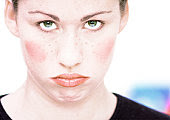Rosacea
Do you have rosacea?
Rosacea is a very common skin disorder or condition. Some have it more severe tha
 n others.
n others.It’s so frustrating, every time you look in the mirror it’s a constant reminder. When you go out in public you feel that it’s the one thing about you that stands out! Or how about this one, ever get people telling you “ Wow it must be really cold outside your cheeks are so red” or “Oooo you got a sunburn” and all you can do is nod your head and agree, because you really don’t feel like getting into it. Yep, that the social aspect of rosacea.
First, let’s start with the symptoms that you are probably experiencing:
- Redness and inflammation, on the central face across the cheeks, nose, or forehead
- Small red solid bumps or pus-filled pimples
- Small blood vessels that are visible on the skin
- Burning or stinging sensations may often occur on the face. Itching or a feeling of tightness
- The central facial skin may be rough, and appear to be very dry.
- Raised red patches, may develop without changes in the surrounding skin.
- The skin may thicken and enlarge from excess tissue, most commonly on the nose. This condition, known as rhinophyma, affects more men than women.
- Occasionally symptoms may also develop beyond the face, most commonly on the neck, chest, scalp or ears
Rosacea usually affects adults, especially those between 30 and 50 years of age who have lighter skin, However, it can also affect children and people of any skin type. Researchers think that heredity and environmental factors are to blame. Others believe that something causes the blood vessels to swell.
Because the signs and symptoms of rosacea varies from one person to another it is important that you are followed by a doctor so that a proper treatment is prescribed. Most of the time they will start you off with oral antibiotics and a topical cream.
There are other available treatment options. Lasers, intense pulsed light sources or other medical and surgical devices may be used to remove visible blood vessels, reduce extensive redness caused by rosacea or correct disfigurement of the nose.
You might also find it helpful to keep a diary. Take note of the days where your rosacea seems to flare up. It is said that certain food, sun exposure, hot weather and stress may play a role.
Helpful Tips
Moisturize….many dermatologists agree that moisturizing helps sooth and prevent burning, stinging, itching and irritation associated with rosacea. By building a strong moisture barrier it will help keep out impurities and irritants that may aggravate sensitive skin. Don’t forget to wash your face first with a mild facial cleanser. The key is to identify your skin type and use medication and skin-care products that are suitable for you.
Protect your face… use sunscreen SPF 15 or more. Not just because it can worsen rosacea but because of the other damage UV rays do to you.
Camouflage…use a green tinted base underneath your foundation, this really help minimize the redness and even out your skin tone.
Pamper yourself…get a nice hydrating facial once in a while. Most esthetician’s know what they are doing they might be able to help.
Since the exact cause of rosacea is unknown, it is important that you do not neglect it and hope that you’ll wake up one morning and it will be gone, that won’t do you any good. GO SEE A DERMATOLOGIST.After all, skin is their specialty.